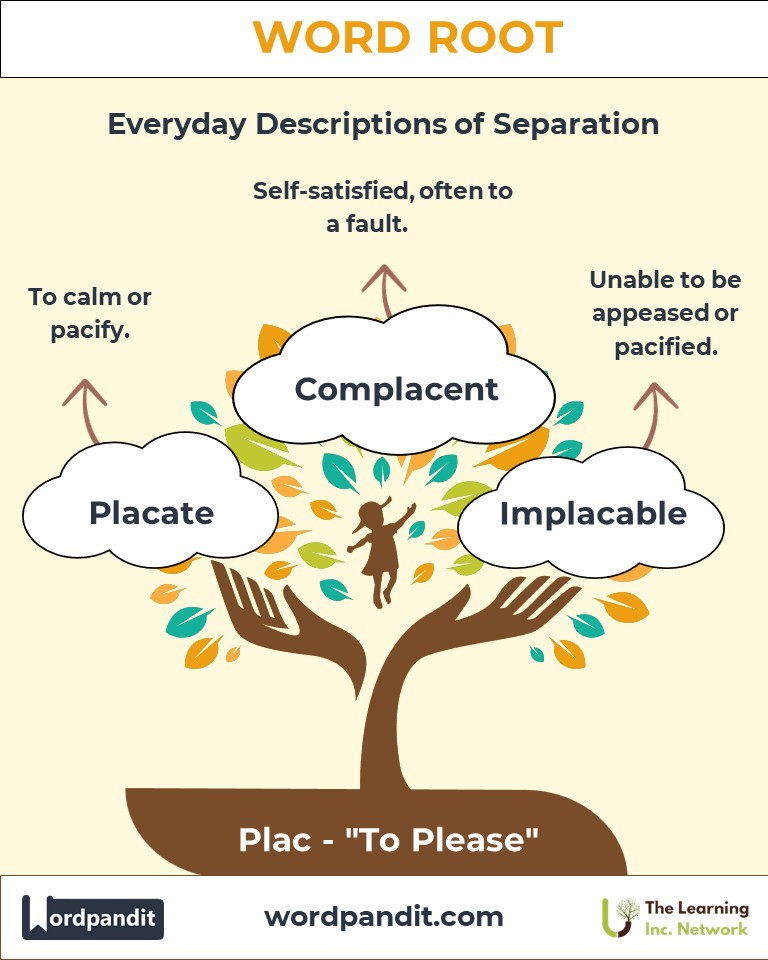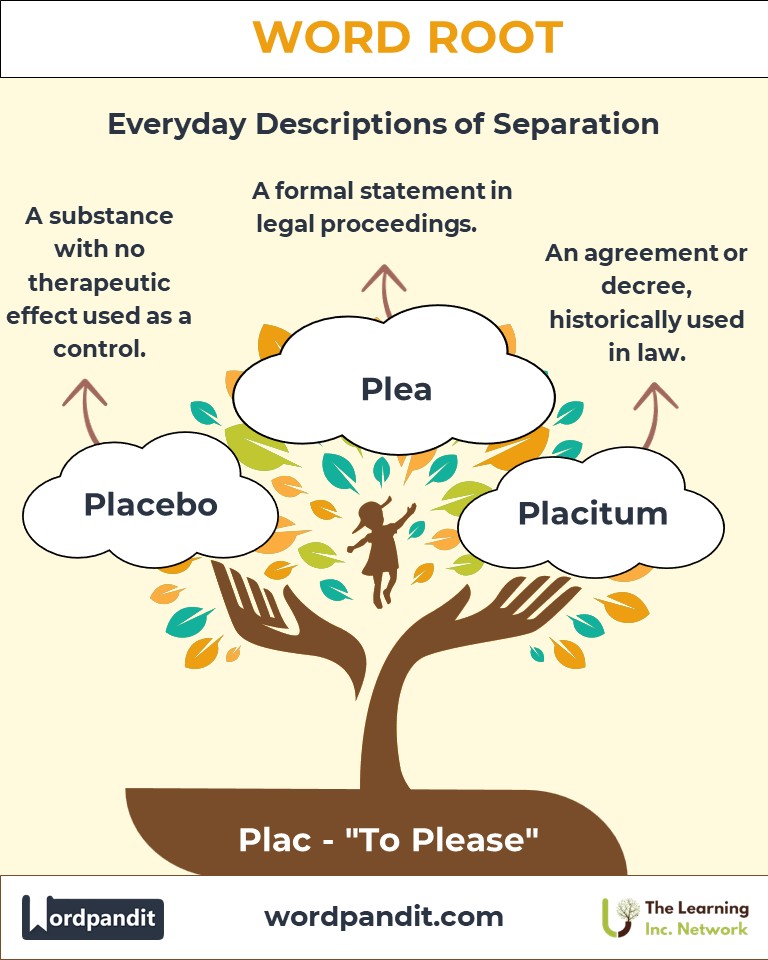Plac: The Root of Harmony and Pleasure in Language and Thought
Discover the depth of the root "Plac," derived from Latin, meaning "to please." From terms like "placate" to "complacent," this root captures the essence of soothing, agreement, and satisfaction in various contexts. Delve into its historical significance, mnemonic aids, and specialized applications across disciplines.

Table of Contents
- Introduction: The Essence of "Plac"
- Etymology and Historical Journey
- Mnemonic: Unlocking the Power of Plac
- Common Plac-Related Terms
- Plac Through Time
- Plac in Specialized Fields
- Illustrative Story: Plac in Action
- Cultural Significance of the Plac Root
- The Plac Family Tree
- FAQs about the Plac Root
- Test Your Knowledge: Plac Mastery Quiz
- Conclusion: The Living Legacy of Plac
1. Introduction: The Essence of "Plac"
Imagine the serenity of resolving a conflict or the delight of pleasing someone. The root "Plac," pronounced plak, conveys the notion of bringing peace, satisfaction, and agreement. Originating from Latin, this root has influenced a spectrum of words tied to pleasing or pacifying. Whether in social harmony or intellectual discourse, "Plac" anchors the language of resolution and contentment.

2. Etymology and Historical Journey
The Latin root "Placere" means "to please" or "to satisfy." Early usages were rooted in personal and social dynamics, focusing on actions that brought pleasure or eased tension. Over centuries, "Plac" expanded into legal, emotional, and philosophical contexts, emphasizing peace and goodwill.
Notable derivatives like "placate" (to calm or appease) emerged during the Middle Ages, reflecting societal shifts toward negotiation and diplomacy. As language evolved, "Plac" continued to embody the ideals of agreement and harmony.
3. Mnemonic: Unlocking the Power of Plac
To remember "Plac," picture a mediator offering a warm cup of tea to calm opposing parties during a negotiation.
Mnemonic Device: "Plac is the tea of peace, soothing and pleasing all it touches."
4. Common Plac-Related Terms
- Placate (plak-ate): To calm or pacify.
Example: "The teacher placated the restless students with an engaging story." - Complacent (kum-play-sent): Self-satisfied, often to a fault.
Example: "His complacent attitude hindered further improvement." - Placebo (pluh-see-boh): A substance with no therapeutic effect used as a control in testing.
Example: "The placebo effect demonstrates the power of belief in healing." - Implacable (im-plak-uh-buhl): Unable to be appeased or pacified.
Example: "The implacable storm raged on, defying all predictions." - Pleasant (plez-uhnt): Enjoyable or agreeable.
Example: "The pleasant weather made the picnic delightful."
5. Plac Through Time
- Placitum (Latin): An agreement or decree.
Historical Note: Used in legal contexts during medieval times, it evolved into the word "plea." - Complacency (Modern Usage): While initially neutral, complacency has taken on a more critical tone, denoting stagnation or unwarranted satisfaction.
6. Plac in Specialized Fields
- Law:
Plea: Derived from "placitum," it signifies a formal statement in legal proceedings.
Example: "The defendant entered a plea of not guilty." - Medicine:
Placebo: Highlights the psychological aspect of healing.
Example: "Placebos play a critical role in clinical trials." - Conflict Resolution:
Placate: Integral in diplomacy and mediation.
Example: "Leaders placated tensions through dialogue."
7. Illustrative Story: Plac in Action
In a bustling town, two neighbors feuded over a shared garden. An implacable tension brewed as they debated its use. Maria, the town mediator, stepped in, bringing homemade pastries and suggesting a shared planting day. Her pleasant demeanor placated the neighbors, transforming their discord into harmony. The garden thrived, a testament to the soothing power of "Plac."
8. Cultural Significance of the Plac Root
The root "Plac" mirrors humanity's universal desire for peace and satisfaction. Across cultures, practices like offering hospitality or resolving conflicts through dialogue echo the essence of "Plac." From ancient rituals of appeasement to modern conflict resolution strategies, it underscores the timeless value of harmony.

9. The Plac Family Tree
- Pac (Latin: "peace")
- Pacify: To bring peace.
- Pact: An agreement.
- Plen (Latin: "full")
- Plenary: Complete or full.
- Plenitude: Abundance.
- Plaud (Latin: "to clap, approve")
- Applaud: To show approval.
- Plaudits: Expressions of praise.

FAQs About the "Plac" Word Root
Q: What does "Plac" mean?
A: The root "Plac" originates from Latin and means "to please" or "to satisfy." It is the foundation for words that describe actions or states associated with soothing, appeasing, or creating agreement.
Q: What is the connection between "Placate" and "Placebo"?
A: Both words stem from the root "Plac." "Placate" means to calm or pacify someone, often to ease tension or anger, while "Placebo," meaning "I shall please" in Latin, refers to a substance given to satisfy a patient's belief in treatment, though it has no therapeutic effect.
Q: How is "Complacent" different from "Pleasant"?
A: "Complacent" refers to being self-satisfied, often in a way that prevents improvement or progress, whereas "pleasant" denotes something enjoyable or agreeable. For example, someone complacent may not strive for betterment, while something pleasant makes a situation more enjoyable.
Q: What does "Implacable" signify?
A: The term "implacable" describes something or someone that cannot be calmed, appeased, or satisfied. It often refers to relentless opposition or anger, such as an implacable foe who refuses reconciliation.
Q: What is the origin of "Plea"?
A: "Plea" comes from the Latin word "placitum," which means "agreement" or "decree." In legal terms, a plea is a formal statement made by a defendant in response to charges, reflecting its roots in seeking resolution or agreement.
Test Your Knowledge: "Plac" Word Root Quiz
1. What does the root "Plac" mean?
2. Which word describes self-satisfaction to a fault?
3. What is a placebo?
4. Which term refers to someone who cannot be pacified?
5. What does "Placate" mean?
12. Conclusion: The Living Legacy of Plac
The root "Plac" continues to shape our understanding of harmony and satisfaction, enriching language across disciplines. Its applications, from medicine to law, reflect its enduring relevance. As we navigate modern challenges, "Plac" reminds us of the timeless value of pleasing and pacifying, fostering peace in every interaction.














